- Home
- G. K. Chesterton
The Wisdom of Father Brown Page 2
The Wisdom of Father Brown Read online
Page 2
TWO. -- The Paradise of Thieves
THE great Muscari, most original of the young Tuscan poets,walked swiftly into his favourite restaurant, which overlooked theMediterranean, was covered by an awning and fenced by little lemon andorange trees. Waiters in white aprons were already laying out on whitetables the insignia of an early and elegant lunch; and this seemed toincrease a satisfaction that already touched the top of swagger. Muscarihad an eagle nose like Dante; his hair and neckerchief were dark andflowing; he carried a black cloak, and might almost have carried a blackmask, so much did he bear with him a sort of Venetian melodrama. Heacted as if a troubadour had still a definite social office, like abishop. He went as near as his century permitted to walking the worldliterally like Don Juan, with rapier and guitar.
For he never travelled without a case of swords, with which he hadfought many brilliant duels, or without a corresponding case for hismandolin, with which he had actually serenaded Miss Ethel Harrogate, thehighly conventional daughter of a Yorkshire banker on a holiday. Yet hewas neither a charlatan nor a child; but a hot, logical Latin who likeda certain thing and was it. His poetry was as straightforward as anyoneelse's prose. He desired fame or wine or the beauty of women witha torrid directness inconceivable among the cloudy ideals or cloudycompromises of the north; to vaguer races his intensity smelt of dangeror even crime. Like fire or the sea, he was too simple to be trusted.
The banker and his beautiful English daughter were staying at the hotelattached to Muscari's restaurant; that was why it was his favouriterestaurant. A glance flashed around the room told him at once, however,that the English party had not descended. The restaurant was glittering,but still comparatively empty. Two priests were talking at a table ina corner, but Muscari (an ardent Catholic) took no more notice of themthan of a couple of crows. But from a yet farther seat, partly concealedbehind a dwarf tree golden with oranges, there rose and advanced towardsthe poet a person whose costume was the most aggressively opposite tohis own.
This figure was clad in tweeds of a piebald check, with a pink tie, asharp collar and protuberant yellow boots. He contrived, in thetrue tradition of 'Arry at Margate, to look at once startling andcommonplace. But as the Cockney apparition drew nearer, Muscari wasastounded to observe that the head was distinctly different from thebody. It was an Italian head: fuzzy, swarthy and very vivacious, thatrose abruptly out of the standing collar like cardboard and the comicpink tie. In fact it was a head he knew. He recognized it, above allthe dire erection of English holiday array, as the face of an old butforgotten friend name Ezza. This youth had been a prodigy at college,and European fame was promised him when he was barely fifteen; but whenhe appeared in the world he failed, first publicly as a dramatist and ademagogue, and then privately for years on end as an actor, a traveller,a commission agent or a journalist. Muscari had known him last behindthe footlights; he was but too well attuned to the excitements of thatprofession, and it was believed that some moral calamity had swallowedhim up.
"Ezza!" cried the poet, rising and shaking hands in a pleasantastonishment. "Well, I've seen you in many costumes in the green room;but I never expected to see you dressed up as an Englishman."
"This," answered Ezza gravely, "is not the costume of an Englishman, butof the Italian of the future."
"In that case," remarked Muscari, "I confess I prefer the Italian of thepast."
"That is your old mistake, Muscari," said the man in tweeds, shakinghis head; "and the mistake of Italy. In the sixteenth century we Tuscansmade the morning: we had the newest steel, the newest carving, thenewest chemistry. Why should we not now have the newest factories, thenewest motors, the newest finance--the newest clothes?"
"Because they are not worth having," answered Muscari. "You cannot makeItalians really progressive; they are too intelligent. Men who see theshort cut to good living will never go by the new elaborate roads."
"Well, to me Marconi, or D'Annunzio, is the star of Italy" said theother. "That is why I have become a Futurist--and a courier."
"A courier!" cried Muscari, laughing. "Is that the last of your list oftrades? And whom are you conducting?"
"Oh, a man of the name of Harrogate, and his family, I believe."
"Not the banker in this hotel?" inquired the poet, with some eagerness.
"That's the man," answered the courier.
"Does it pay well?" asked the troubadour innocently.
"It will pay me," said Ezza, with a very enigmatic smile. "But I am arather curious sort of courier." Then, as if changing the subject, hesaid abruptly: "He has a daughter--and a son."
"The daughter is divine," affirmed Muscari, "the father and son are, Isuppose, human. But granted his harmless qualities doesn't that bankerstrike you as a splendid instance of my argument? Harrogate has millionsin his safes, and I have--the hole in my pocket. But you daren'tsay--you can't say--that he's cleverer than I, or bolder than I, or evenmore energetic. He's not clever, he's got eyes like blue buttons; he'snot energetic, he moves from chair to chair like a paralytic. He's aconscientious, kindly old blockhead; but he's got money simply becausehe collects money, as a boy collects stamps. You're too strong-mindedfor business, Ezza. You won't get on. To be clever enough to get allthat money, one must be stupid enough to want it."
"I'm stupid enough for that," said Ezza gloomily. "But I should suggesta suspension of your critique of the banker, for here he comes."
Mr Harrogate, the great financier, did indeed enter the room, but nobodylooked at him. He was a massive elderly man with a boiled blue eye andfaded grey-sandy moustaches; but for his heavy stoop he might have beena colonel. He carried several unopened letters in his hand. His sonFrank was a really fine lad, curly-haired, sun-burnt and strenuous; butnobody looked at him either. All eyes, as usual, were riveted, forthe moment at least, upon Ethel Harrogate, whose golden Greek head andcolour of the dawn seemed set purposely above that sapphire sea, likea goddess's. The poet Muscari drew a deep breath as if he were drinkingsomething, as indeed he was. He was drinking the Classic; which hisfathers made. Ezza studied her with a gaze equally intense and far morebaffling.
Miss Harrogate was specially radiant and ready for conversation on thisoccasion; and her family had fallen into the easier Continental habit,allowing the stranger Muscari and even the courier Ezza to share theirtable and their talk. In Ethel Harrogate conventionality crowned itselfwith a perfection and splendour of its own. Proud of her father'sprosperity, fond of fashionable pleasures, a fond daughter but an arrantflirt, she was all these things with a sort of golden good-nature thatmade her very pride pleasing and her worldly respectability a fresh andhearty thing.
They were in an eddy of excitement about some alleged peril in themountain path they were to attempt that week. The danger was not fromrock and avalanche, but from something yet more romantic. Ethel hadbeen earnestly assured that brigands, the true cut-throats of the modernlegend, still haunted that ridge and held that pass of the Apennines.
"They say," she cried, with the awful relish of a schoolgirl, "thatall that country isn't ruled by the King of Italy, but by the King ofThieves. Who is the King of Thieves?"
"A great man," replied Muscari, "worthy to rank with your own RobinHood, signorina. Montano, the King of Thieves, was first heard of in themountains some ten years ago, when people said brigands were extinct.But his wild authority spread with the swiftness of a silent revolution.Men found his fierce proclamations nailed in every mountain village; hissentinels, gun in hand, in every mountain ravine. Six times the ItalianGovernment tried to dislodge him, and was defeated in six pitchedbattles as if by Napoleon."
"Now that sort of thing," observed the banker weightily, "would neverbe allowed in England; perhaps, after all, we had better choose anotherroute. But the courier thought it perfectly safe."
"It is perfectly safe," said the courier contemptuously. "I have beenover it twenty times. There may have been some old jailbird called aKing in the time of our grandmothers; but he belongs to history if notto
fable. Brigandage is utterly stamped out."
"It can never be utterly stamped out," Muscari answered; "because armedrevolt is a recreation natural to southerners. Our peasants are liketheir mountains, rich in grace and green gaiety, but with the firesbeneath. There is a point of human despair where the northern poor taketo drink--and our own poor take to daggers."
"A poet is privileged," replied Ezza, with a sneer. "If Signor Muscariwere English he would still be looking for highwaymen in Wandsworth.Believe me, there is no more danger of being captured in Italy than ofbeing scalped in Boston."
"Then you propose to attempt it?" asked Mr Harrogate, frowning.
"Oh, it sounds rather dreadful," cried the girl, turning her gloriouseyes on Muscari. "Do you really think the pass is dangerous?"
Muscari threw back his black mane. "I know it is dangerous:" he said. "Iam crossing it tomorrow."
The young Harrogate was left behind for a moment emptying a glass ofwhite wine and lighting a cigarette, as the beauty retired with thebanker, the courier and the poet, distributing peals of silvery satire.At about the same instant the two priests in the corner rose; thetaller, a white-haired Italian, taking his leave. The shorter priestturned and walked towards the banker's son, and the latter wasastonished to realize that though a Roman priest the man was anEnglishman. He vaguely remembered meeting him at the social crushesof some of his Catholic friends. But the man spoke before his memoriescould collect themselves.
"Mr Frank Harrogate, I think," he said. "I have had an introduction, butI do not mean to presume on it. The odd thing I have to say will comefar better from a stranger. Mr Harrogate, I say one word and go: takecare of your sister in her great sorrow."
Even for Frank's truly fraternal indifference the radiance and derisionof his sister still seemed to sparkle and ring; he could hear herlaughter still from the garden of the hotel, and he stared at his sombreadviser in puzzledom.
"Do you mean the brigands?" he asked; and then, remembering a vague fearof his own, "or can you be thinking of Muscari?"
"One is never thinking of the real sorrow," said the strange priest."One can only be kind when it comes."
And he passed promptly from the room, leaving the other almost with hismouth open.
A day or two afterwards a coach containing the company was reallycrawling and staggering up the spurs of the menacing mountain range.Between Ezza's cheery denial of the danger and Muscari's boisterousdefiance of it, the financial family were firm in their originalpurpose; and Muscari made his mountain journey coincide with theirs. Amore surprising feature was the appearance at the coast-town station ofthe little priest of the restaurant; he alleged merely that businessled him also to cross the mountains of the midland. But young Harrogatecould not but connect his presence with the mystical fears and warningsof yesterday.
The coach was a kind of commodious wagonette, invented by the modernisttalent of the courier, who dominated the expedition with his scientificactivity and breezy wit. The theory of danger from thieves was banishedfrom thought and speech; though so far conceded in formal act that someslight protection was employed. The courier and the young banker carriedloaded revolvers, and Muscari (with much boyish gratification) buckledon a kind of cutlass under his black cloak.
He had planted his person at a flying leap next to the lovelyEnglishwoman; on the other side of her sat the priest, whose name wasBrown and who was fortunately a silent individual; the courier and thefather and son were on the banc behind. Muscari was in towering spirits,seriously believing in the peril, and his talk to Ethel might well havemade her think him a maniac. But there was something in the crazy andgorgeous ascent, amid crags like peaks loaded with woods like orchards,that dragged her spirit up alone with his into purple preposterousheavens with wheeling suns. The white road climbed like a white cat;it spanned sunless chasms like a tight-rope; it was flung round far-offheadlands like a lasso.
And yet, however high they went, the desert still blossomed like therose. The fields were burnished in sun and wind with the colour ofkingfisher and parrot and humming-bird, the hues of a hundred floweringflowers. There are no lovelier meadows and woodlands than the English,no nobler crests or chasms than those of Snowdon and Glencoe. ButEthel Harrogate had never before seen the southern parks tilted on thesplintered northern peaks; the gorge of Glencoe laden with the fruitsof Kent. There was nothing here of that chill and desolation that inBritain one associates with high and wild scenery. It was rather like amosaic palace, rent with earthquakes; or like a Dutch tulip garden blownto the stars with dynamite.
"It's like Kew Gardens on Beachy Head," said Ethel.
"It is our secret," answered he, "the secret of the volcano; that isalso the secret of the revolution--that a thing can be violent and yetfruitful."
"You are rather violent yourself," and she smiled at him.
"And yet rather fruitless," he admitted; "if I die tonight I dieunmarried and a fool."
"It is not my fault if you have come," she said after a difficultsilence.
"It is never your fault," answered Muscari; "it was not your fault thatTroy fell."
As they spoke they came under overwhelming cliffs that spread almostlike wings above a corner of peculiar peril. Shocked by the big shadowon the narrow ledge, the horses stirred doubtfully. The driver leapt tothe earth to hold their heads, and they became ungovernable. One horsereared up to his full height--the titanic and terrifying height ofa horse when he becomes a biped. It was just enough to alter theequilibrium; the whole coach heeled over like a ship and crashed throughthe fringe of bushes over the cliff. Muscari threw an arm round Ethel,who clung to him, and shouted aloud. It was for such moments that helived.
At the moment when the gorgeous mountain walls went round the poet'shead like a purple windmill a thing happened which was superficiallyeven more startling. The elderly and lethargic banker sprang erect inthe coach and leapt over the precipice before the tilted vehicle couldtake him there. In the first flash it looked as wild as suicide; but inthe second it was as sensible as a safe investment. The Yorkshireman hadevidently more promptitude, as well as more sagacity, than Muscari hadgiven him credit for; for he landed in a lap of land which mighthave been specially padded with turf and clover to receive him. Asit happened, indeed, the whole company were equally lucky, if lessdignified in their form of ejection. Immediately under this abrupt turnof the road was a grassy and flowery hollow like a sunken meadow; asort of green velvet pocket in the long, green, trailing garments ofthe hills. Into this they were all tipped or tumbled with little damage,save that their smallest baggage and even the contents of their pocketswere scattered in the grass around them. The wrecked coach still hungabove, entangled in the tough hedge, and the horses plunged painfullydown the slope. The first to sit up was the little priest, who scratchedhis head with a face of foolish wonder. Frank Harrogate heard him say tohimself: "Now why on earth have we fallen just here?"
He blinked at the litter around him, and recovered his own very clumsyumbrella. Beyond it lay the broad sombrero fallen from the head ofMuscari, and beside it a sealed business letter which, after a glanceat the address, he returned to the elder Harrogate. On the other side ofhim the grass partly hid Miss Ethel's sunshade, and just beyond it lay acurious little glass bottle hardly two inches long. The priest picked itup; in a quick, unobtrusive manner he uncorked and sniffed it, and hisheavy face turned the colour of clay.
"Heaven deliver us!" he muttered; "it can't be hers! Has her sorrow comeon her already?" He slipped it into his own waistcoat pocket. "I thinkI'm justified," he said, "till I know a little more."
He gazed painfully at the girl, at that moment being raised out of theflowers by Muscari, who was saying: "We have fallen into heaven; it isa sign. Mortals climb up and they fall down; but it is only gods andgoddesses who can fall upwards."
And indeed she rose out of the sea of colours so beautiful and happya vision that the priest felt his suspicion shaken and shifted. "Afterall," he thought, "perhaps the poison isn't h
ers; perhaps it's one ofMuscari's melodramatic tricks."
Muscari set the lady lightly on her feet, made her an absurdlytheatrical bow, and then, drawing his cutlass, hacked hard at the tautreins of the horses, so that they scrambled to their feet and stoodin the grass trembling. When he had done so, a most remarkable thingoccurred. A very quiet man, very poorly dressed and extremely sunburnt,came out of the bushes and took hold of the horses' heads. He had aqueer-shaped knife, very broad and crooked, buckled on his belt; therewas nothing else remarkable about him, except his sudden and silentappearance. The poet asked him who he was, and he did not answer.
Looking around him at the confused and startled group in the hollow,Muscari then perceived that another tanned and tattered man, with ashort gun under his arm, was looking at them from the ledge just below,leaning his elbows on the edge of the turf. Then he looked up at theroad from which they had fallen and saw, looking down on them, themuzzles of four other carbines and four other brown faces with brightbut quite motionless eyes.
"The brigands!" cried Muscari, with a kind of monstrous gaiety. "Thiswas a trap. Ezza, if you will oblige me by shooting the coachman first,we can cut our way out yet. There are only six of them."
"The coachman," said Ezza, who was standing grimly with his hands in hispockets, "happens to be a servant of Mr Harrogate's."
"Then shoot him all the more," cried the poet impatiently; "he wasbribed to upset his master. Then put the lady in the middle, and we willbreak the line up there--with a rush."
And, wading in wild grass and flowers, he advanced fearlessly on thefour carbines; but finding that no one followed except young Harrogate,he turned, brandishing his cutlass to wave the others on. He beheldthe courier still standing slightly astride in the centre of the grassyring, his hands in his pockets; and his lean, ironical Italian faceseemed to grow longer and longer in the evening light.
"You thought, Muscari, I was the failure among our schoolfellows," hesaid, "and you thought you were the success. But I have succeeded morethan you and fill a bigger place in history. I have been acting epicswhile you have been writing them."
"Come on, I tell you!" thundered Muscari from above. "Will you standthere talking nonsense about yourself with a woman to save and threestrong men to help you? What do you call yourself?"
"I call myself Montano," cried the strange courier in a voice equallyloud and full. "I am the King of Thieves, and I welcome you all to mysummer palace."
And even as he spoke five more silent men with weapons ready came out ofthe bushes, and looked towards him for their orders. One of them held alarge paper in his hand.
"This pretty little nest where we are all picnicking," went on thecourier-brigand, with the same easy yet sinister smile, "is, togetherwith some caves underneath it, known by the name of the Paradise ofThieves. It is my principal stronghold on these hills; for (as you havedoubtless noticed) the eyrie is invisible both from the road above andfrom the valley below. It is something better than impregnable; it isunnoticeable. Here I mostly live, and here I shall certainly die, ifthe gendarmes ever track me here. I am not the kind of criminal that'reserves his defence,' but the better kind that reserves his lastbullet."
All were staring at him thunderstruck and still, except Father Brown,who heaved a huge sigh as of relief and fingered the little phial in hispocket. "Thank God!" he muttered; "that's much more probable. The poisonbelongs to this robber-chief, of course. He carries it so that he maynever be captured, like Cato."
The King of Thieves was, however, continuing his address with the samekind of dangerous politeness. "It only remains for me," he said,"to explain to my guests the social conditions upon which I have thepleasure of entertaining them. I need not expound the quaint old ritualof ransom, which it is incumbent upon me to keep up; and even this onlyapplies to a part of the company. The Reverend Father Brown and thecelebrated Signor Muscari I shall release tomorrow at dawn and escortto my outposts. Poets and priests, if you will pardon my simplicityof speech, never have any money. And so (since it is impossible toget anything out of them), let us, seize the opportunity to show ouradmiration for classic literature and our reverence for Holy Church."
He paused with an unpleasing smile; and Father Brown blinked repeatedlyat him, and seemed suddenly to be listening with great attention. Thebrigand captain took the large paper from the attendant brigand and,glancing over it, continued: "My other intentions are clearly set forthin this public document, which I will hand round in a moment; and whichafter that will be posted on a tree by every village in the valley, andevery cross-road in the hills. I will not weary you with the verbalism,since you will be able to check it; the substance of my proclamation isthis: I announce first that I have captured the English millionaire, thecolossus of finance, Mr Samuel Harrogate. I next announce that I havefound on his person notes and bonds for two thousand pounds, which hehas given up to me. Now since it would be really immoral to announcesuch a thing to a credulous public if it had not occurred, I suggest itshould occur without further delay. I suggest that Mr Harrogate seniorshould now give me the two thousand pounds in his pocket."
The banker looked at him under lowering brows, red-faced and sulky, butseemingly cowed. That leap from the failing carriage seemed to have usedup his last virility. He had held back in a hang-dog style when his sonand Muscari had made a bold movement to break out of the brigandtrap. And now his red and trembling hand went reluctantly to hisbreast-pocket, and passed a bundle of papers and envelopes to thebrigand.
"Excellent!" cried that outlaw gaily; "so far we are all cosy. I resumethe points of my proclamation, so soon to be published to all Italy.The third item is that of ransom. I am asking from the friends of theHarrogate family a ransom of three thousand pounds, which I am sureis almost insulting to that family in its moderate estimate of theirimportance. Who would not pay triple this sum for another day'sassociation with such a domestic circle? I will not conceal from youthat the document ends with certain legal phrases about the unpleasantthings that may happen if the money is not paid; but meanwhile, ladiesand gentlemen, let me assure you that I am comfortably off herefor accommodation, wine and cigars, and bid you for the present asportsman-like welcome to the luxuries of the Paradise of Thieves."
All the time that he had been speaking, the dubious-looking men withcarbines and dirty slouch hats had been gathering silently in suchpreponderating numbers that even Muscari was compelled to recognize hissally with the sword as hopeless. He glanced around him; but the girlhad already gone over to soothe and comfort her father, for her naturalaffection for his person was as strong or stronger than her somewhatsnobbish pride in his success. Muscari, with the illogicality of alover, admired this filial devotion, and yet was irritated by it.He slapped his sword back in the scabbard and went and flung himselfsomewhat sulkily on one of the green banks. The priest sat down withina yard or two, and Muscari turned his aquiline nose on him in aninstantaneous irritation.
"Well," said the poet tartly, "do people still think me too romantic?Are there, I wonder, any brigands left in the mountains?"
"There may be," said Father Brown agnostically.
"What do you mean?" asked the other sharply.
"I mean I am puzzled," replied the priest. "I am puzzled about Ezza orMontano, or whatever his name is. He seems to me much more inexplicableas a brigand even than he was as a courier."
"But in what way?" persisted his companion. "Santa Maria! I should havethought the brigand was plain enough."
"I find three curious difficulties," said the priest in a quiet voice."I should like to have your opinion on them. First of all I must tellyou I was lunching in that restaurant at the seaside. As four of youleft the room, you and Miss Harrogate went ahead, talking and laughing;the banker and the courier came behind, speaking sparely and rather low.But I could not help hearing Ezza say these words--'Well, let her havea little fun; you know the blow may smash her any minute.' Mr Harrogateanswered nothing; so the words must have had some meaning. On theimpulse of th
e moment I warned her brother that she might be in peril;I said nothing of its nature, for I did not know. But if it meantthis capture in the hills, the thing is nonsense. Why should thebrigand-courier warn his patron, even by a hint, when it was his wholepurpose to lure him into the mountain-mousetrap? It could not havemeant that. But if not, what is this disaster, known both to courier andbanker, which hangs over Miss Harrogate's head?"
"Disaster to Miss Harrogate!" ejaculated the poet, sitting up with someferocity. "Explain yourself; go on."
"All my riddles, however, revolve round our bandit chief," resumed thepriest reflectively. "And here is the second of them. Why did he putso prominently in his demand for ransom the fact that he had taken twothousand pounds from his victim on the spot? It had no faintest tendencyto evoke the ransom. Quite the other way, in fact. Harrogate's friendswould be far likelier to fear for his fate if they thought the thieveswere poor and desperate. Yet the spoliation on the spot was emphasizedand even put first in the demand. Why should Ezza Montano want sospecially to tell all Europe that he had picked the pocket before helevied the blackmail?"
"I cannot imagine," said Muscari, rubbing up his black hair for oncewith an unaffected gesture. "You may think you enlighten me, but you areleading me deeper in the dark. What may be the third objection to theKing of the Thieves?" "The third objection," said Father Brown, stillin meditation, "is this bank we are sitting on. Why does ourbrigand-courier call this his chief fortress and the Paradise ofThieves? It is certainly a soft spot to fall on and a sweet spot to lookat. It is also quite true, as he says, that it is invisible from valleyand peak, and is therefore a hiding-place. But it is not a fortress. Itnever could be a fortress. I think it would be the worst fortress in theworld. For it is actually commanded from above by the common high-roadacross the mountains--the very place where the police would mostprobably pass. Why, five shabby short guns held us helpless here abouthalf an hour ago. The quarter of a company of any kind of soldiers couldhave blown us over the precipice. Whatever is the meaning of this oddlittle nook of grass and flowers, it is not an entrenched position. Itis something else; it has some other strange sort of importance; somevalue that I do not understand. It is more like an accidental theatre ora natural green-room; it is like the scene for some romantic comedy; itis like...."
As the little priest's words lengthened and lost themselves in a dulland dreamy sincerity, Muscari, whose animal senses were alert andimpatient, heard a new noise in the mountains. Even for him the soundwas as yet very small and faint; but he could have sworn the eveningbreeze bore with it something like the pulsation of horses' hoofs and adistant hallooing.
At the same moment, and long before the vibration had touched theless-experienced English ears, Montano the brigand ran up the bank abovethem and stood in the broken hedge, steadying himself against a tree andpeering down the road. He was a strange figure as he stood there, for hehad assumed a flapped fantastic hat and swinging baldric and cutlass inhis capacity of bandit king, but the bright prosaic tweed of the couriershowed through in patches all over him.
The next moment he turned his olive, sneering face and made a movementwith his hand. The brigands scattered at the signal, not in confusion,but in what was evidently a kind of guerrilla discipline. Instead ofoccupying the road along the ridge, they sprinkled themselves along theside of it behind the trees and the hedge, as if watching unseen for anenemy. The noise beyond grew stronger, beginning to shake the mountainroad, and a voice could be clearly heard calling out orders. Thebrigands swayed and huddled, cursing and whispering, and the eveningair was full of little metallic noises as they cocked their pistols, orloosened their knives, or trailed their scabbards over the stones. Thenthe noises from both quarters seemed to meet on the road above; branchesbroke, horses neighed, men cried out.
"A rescue!" cried Muscari, springing to his feet and waving his hat;"the gendarmes are on them! Now for freedom and a blow for it! Now tobe rebels against robbers! Come, don't let us leave everything tothe police; that is so dreadfully modern. Fall on the rear of theseruffians. The gendarmes are rescuing us; come, friends, let us rescuethe gendarmes!"
And throwing his hat over the trees, he drew his cutlass once more andbegan to escalade the slope up to the road. Frank Harrogate jumped upand ran across to help him, revolver in hand, but was astounded to hearhimself imperatively recalled by the raucous voice of his father, whoseemed to be in great agitation.
"I won't have it," said the banker in a choking voice; "I command younot to interfere."
"But, father," said Frank very warmly, "an Italian gentleman has led theway. You wouldn't have it said that the English hung back."
"It is useless," said the older man, who was trembling violently, "it isuseless. We must submit to our lot."
Father Brown looked at the banker; then he put his hand instinctively asif on his heart, but really on the little bottle of poison; and a greatlight came into his face like the light of the revelation of death.
Muscari meanwhile, without waiting for support, had crested the bankup to the road, and struck the brigand king heavily on the shoulder,causing him to stagger and swing round. Montano also had his cutlassunsheathed, and Muscari, without further speech, sent a slash at hishead which he was compelled to catch and parry. But even as the twoshort blades crossed and clashed the King of Thieves deliberatelydropped his point and laughed.
"What's the good, old man?" he said in spirited Italian slang; "thisdamned farce will soon be over."
"What do you mean, you shuffler?" panted the fire-eating poet. "Is yourcourage a sham as well as your honesty?"
"Everything about me is a sham," responded the ex-courier in completegood humour. "I am an actor; and if I ever had a private character, Ihave forgotten it. I am no more a genuine brigand than I am a genuinecourier. I am only a bundle of masks, and you can't fight a duelwith that." And he laughed with boyish pleasure and fell into his oldstraddling attitude, with his back to the skirmish up the road.
Darkness was deepening under the mountain walls, and it was not easy todiscern much of the progress of the struggle, save that tall men werepushing their horses' muzzles through a clinging crowd of brigands,who seemed more inclined to harass and hustle the invaders than to killthem. It was more like a town crowd preventing the passage of the policethan anything the poet had ever pictured as the last stand of doomed andoutlawed men of blood. Just as he was rolling his eyes in bewildermenthe felt a touch on his elbow, and found the odd little priest standingthere like a small Noah with a large hat, and requesting the favour of aword or two.
"Signor Muscari," said the cleric, "in this queer crisis personalitiesmay be pardoned. I may tell you without offence of a way in which youwill do more good than by helping the gendarmes, who are bound to breakthrough in any case. You will permit me the impertinent intimacy, but doyou care about that girl? Care enough to marry her and make her a goodhusband, I mean?"
"Yes," said the poet quite simply.
"Does she care about you?"
"I think so," was the equally grave reply.
"Then go over there and offer yourself," said the priest: "offer hereverything you can; offer her heaven and earth if you've got them. Thetime is short."
"Why?" asked the astonished man of letters.
"Because," said Father Brown, "her Doom is coming up the road."
"Nothing is coming up the road," argued Muscari, "except the rescue."
"Well, you go over there," said his adviser, "and be ready to rescue herfrom the rescue."
Almost as he spoke the hedges were broken all along the ridge by a rushof the escaping brigands. They dived into bushes and thick grasslike defeated men pursued; and the great cocked hats of the mountedgendarmerie were seen passing along above the broken hedge. Anotherorder was given; there was a noise of dismounting, and a tall officerwith cocked hat, a grey imperial, and a paper in his hand appearedin the gap that was the gate of the Paradise of Thieves. There was amomentary silence, broken in an extraordinary way by the ba
nker, whocried out in a hoarse and strangled voice: "Robbed! I've been robbed!"
"Why, that was hours ago," cried his son in astonishment: "when you wererobbed of two thousand pounds."
"Not of two thousand pounds," said the financier, with an abrupt andterrible composure, "only of a small bottle."
The policeman with the grey imperial was striding across the greenhollow. Encountering the King of the Thieves in his path, he clapped himon the shoulder with something between a caress and a buffet and gavehim a push that sent him staggering away. "You'll get into trouble,too," he said, "if you play these tricks."
Again to Muscari's artistic eye it seemed scarcely like the capture ofa great outlaw at bay. Passing on, the policeman halted before theHarrogate group and said: "Samuel Harrogate, I arrest you in the nameof the law for embezzlement of the funds of the Hull and HuddersfieldBank."
The great banker nodded with an odd air of business assent, seemed toreflect a moment, and before they could interpose took a half turn anda step that brought him to the edge of the outer mountain wall. Then,flinging up his hands, he leapt exactly as he leapt out of the coach.But this time he did not fall into a little meadow just beneath; he fella thousand feet below, to become a wreck of bones in the valley.
The anger of the Italian policeman, which he expressed volubly to FatherBrown, was largely mixed with admiration. "It was like him to escape usat last," he said. "He was a great brigand if you like. This lasttrick of his I believe to be absolutely unprecedented. He fled withthe company's money to Italy, and actually got himself captured by shambrigands in his own pay, so as to explain both the disappearance ofthe money and the disappearance of himself. That demand for ransom wasreally taken seriously by most of the police. But for years he's beendoing things as good as that, quite as good as that. He will be aserious loss to his family."
Muscari was leading away the unhappy daughter, who held hard to him, asshe did for many a year after. But even in that tragic wreck he couldnot help having a smile and a hand of half-mocking friendship for theindefensible Ezza Montano. "And where are you going next?" he asked himover his shoulder.
"Birmingham," answered the actor, puffing a cigarette. "Didn't I tellyou I was a Futurist? I really do believe in those things if I believein anything. Change, bustle and new things every morning. I am going toManchester, Liverpool, Leeds, Hull, Huddersfield, Glasgow, Chicago--inshort, to enlightened, energetic, civilized society!"
"In short," said Muscari, "to the real Paradise of Thieves."

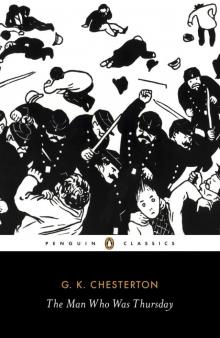 The Man Who Was Thursday: A Nightmare
The Man Who Was Thursday: A Nightmare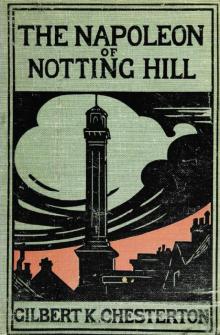 The Napoleon of Notting Hill
The Napoleon of Notting Hill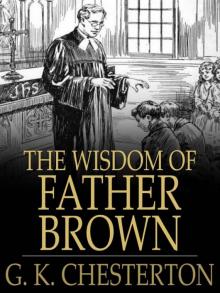 The Wisdom of Father Brown
The Wisdom of Father Brown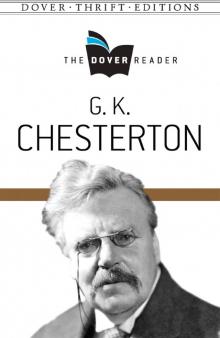 G K Chesterton- The Dover Reader
G K Chesterton- The Dover Reader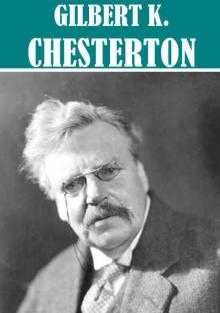 The Essential G. K. Chesterton
The Essential G. K. Chesterton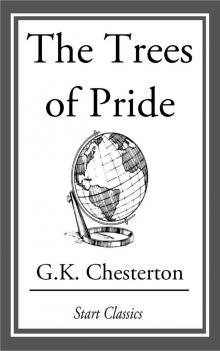 The Trees of Pride
The Trees of Pride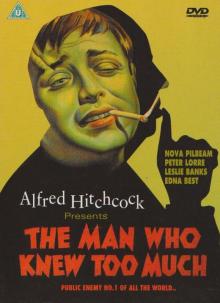 The Man Who Knew Too Much
The Man Who Knew Too Much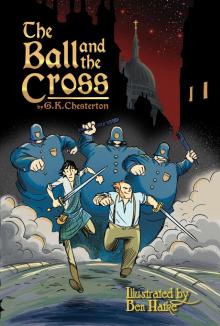 The Ball and the Cross
The Ball and the Cross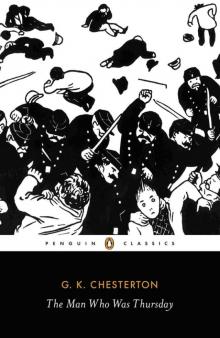 The Man Who Was Thursday (Penguin ed)
The Man Who Was Thursday (Penguin ed)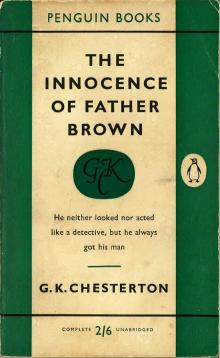 The Innocence of Father Brown
The Innocence of Father Brown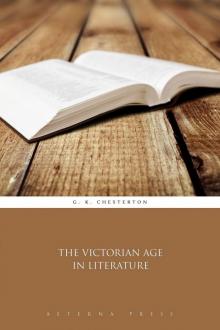 The Victorian Age in Literature
The Victorian Age in Literature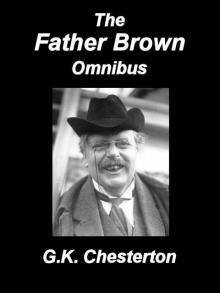 Father Brown Omnibus
Father Brown Omnibus Murder On Christmas Eve
Murder On Christmas Eve The Blue Cross
The Blue Cross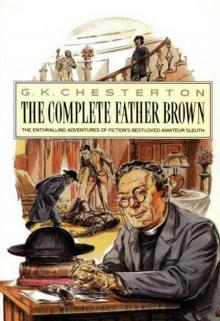 The Complete Father Brown Mysteries Collection
The Complete Father Brown Mysteries Collection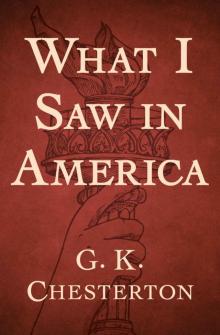 What I Saw in America
What I Saw in America